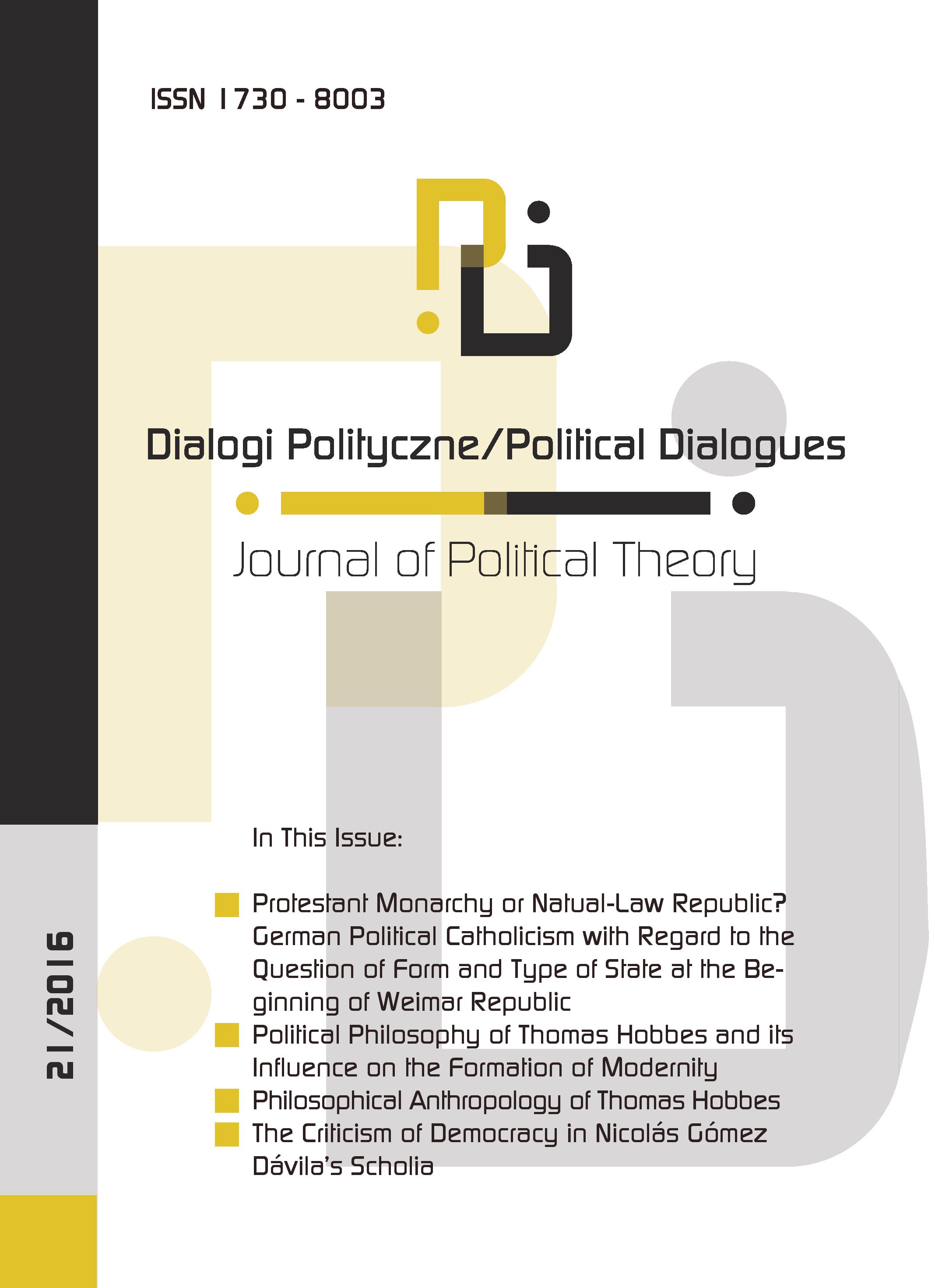Protestancka monarchia czy prawno-naturalna republika? Niemiecki katolicyzm polityczny wobec kwestii formy i typu państwa u zarania Republiki Weimarskiej
DOI:
https://doi.org/10.12775/DP.2016.032Słowa kluczowe:
Niemcy, monarchia, republika, legitymizm, chrześcijańska demokracjaAbstrakt
The purpose of this text is the presentation of political discussion between many Catholics around the form of the state (regime) of Germany after World War I and the fall of the Empire of Hohenzollern. Legitimists were supporters of the science of St. Augustine and recognized monarchism as a "dogma" of faith. Christian Democrats (Zentrum) advocates St. Thomas learning and accepted the republic, if will be Christian. We believe that this theological and political discussions must be viewed in the perspective of the position of German Catholicism in the State. Catholics are 1/3 of the population, and the fallen empire was anti-Catholic, because strongly Lutheran (Kulturkampf). German monarchists viewed the question of regime only from the theological and ideological perspective. Christian democracy viewed this question from a political perspective, searching system that will best protect the rights of the Catholic minority.Bibliografia
Aufruf und Leitsätze der Deutschen Zentrumspartei vom 30. Dezember 1918. [w:] W. Mommsen (red.): Deutsche Parteiprogramme. München 1960.
J. Bartyzel: Legitymizm. Historia i teraźniejszość. Wrocław 2009.
J.P. Beckmann: Wilhelm von Ockham. München 1995.
B. Bourdin: La genèse théologico-politique de l’Etat moderne: la controverse de Jacques Ier d’Angleterre avec le cardinal Bellarmin. Paris 2004.
J. Breuilly: Nationalismus und moderner Staat. Deutschland und Europa. Köln 1999.
V. Cathrein: Recht, Naturrecht und positives Recht. Freiburg 1909.
V. Cathrein: Der Sozialismus. Freiburg 1923.
M. Conway: Catholic Politics in Europe, 1918-1945. London 1997.
A. Couartou: La Souveraineté Populaire chez Francisco Suarez. Bordeaux 1974.
M. Dahlheimer: Carl Schmitt und der deutsche Katholizismus, 1886-1936. Paderborn 1998.
O. Dann: Nation und Nationalismus in Deutschland 1770-1990. München 1996.
G. Ebers: Reichsverfassung und christliche Staatslehre, „Hochland“, 1929, nr 26.
J. Fueyo Alvarez: La teologia politica del Estado-nación y el anglicanismo politico, “Revista de Estudios Politicos”, 1968, nr 157.
J.-D. Gauger: Nation, Nationbewußtstein und Nationwerdung in der deutschen Geschichte. [w:] K. Weigelt (red.): Heimat und Nation. Zur Geschichte und Identität der Deutschen. Mainz 1984.
I. Gómez Robledo: El origen del poder político según Francisco Suárez. Mexico 1998.
Heinrich Schrörs (1852-1928), Kirchenhistoriker, na stronie internetowej rheinische-geschichte.lvr.de [04.08.2016].
H. Höpfl: Jesuit Political Thought. The Society of Jesus and the State, c. 1540-1630. New York 2004.
F.X. Kiefl: Die Staatsphilosophie der katholischen Kirche und die Frage der Legitimität in Erbmonarchie. Regensburg 1928.
F. Knopper: L’autorité dynastique au service de la Parole: les testaments politiques des Hohenzollern (1667-1768), “Anglophonia”, 2005, nr 17.
M. Kopczyński: Między konserwatyzmem i nacjonalizmem. Myśl polityczna Ottona von Bismarcka. Toruń 2013.
M. Korinman: ‘Deutschland über alles’. Le pangermanisme, 1890-1945. Paris 1999.
M. Lienhard: Martin Luther. Un temps, une vie, un message. Genève 1991.
B. Moeller: Deutschland im Zeitalter der Reformation. Göttingen 1999.
R. Morsey: Die Deutsche Zentrumspartei, 1917-1923. Düsseldorf 1966.
Nationalpolitisches und Sozialpolitisches Manifest der Zentrumsfraktion des Reichstages vom 21. Januar 1927. [w:] W. Mommsen (red.): Deutsche Parteiprogramme. München 1960.
F. Oakley: Jacobean Political Theology: the Absolute and Ordinary Powers of the King, “Journal of the History of Ideas”, 1968, nr 29.
Ph. Prévost: L’Eglise et le ralliemenet. Histoire d’une crise 1892-2000. Paris 2001.
Richtlinien der Deutschen Zentrumspartei vom 16. Januar 1922. [w:] W. Mommsen (red.): Deutsche Parteiprogramme. München 1960.
H. Rommen: La teoria del Estado y de la communidad internacional en Francisco Suarez. Buenos Aires 1951.
M. Sadowski: Państwo w doktrynie papieża Leona XIII. Wrocław 2002.
O. Schilling: Christliche Sozial- und Rechtsphilosophie. München 1950 [1929].
O. Schilling: Katholische Wirtschaftsethik. Nach den Richtlinien der Enzyklik Quadregesimo Anno des Papstes Pius XI. München 1933.
O. Schilling: Der Kirchliche Eigentumsbegriff. Freiburg 1930.
O. Schilling: Die Soziale Frage. München 1931.
O. Schilling: Die Staats- und Soziallehre des hl. Thomas von Aquin. München 1930.
O. Schilling: Die Staats- und Soziallehre des Papstes Leo XIII, Köln 1925.
C. Schmitt: Positionen und Begriffe im Kampf mit Weimar-Genf-Versailles 1923-1939. Berlin 1988.
H. Schrörs: Katholische Staatsauffassung. Kirche und Staat. Freiburg im Breisgau 1919.
J. Simiele: Lutero y la politica. „Enfoques”, 2010, nr 1.
D. Steffen: Bürgerliche Rechtseinheit und der Politischer Katholizismus. Paderborn 2008.
G. Thils: Primauté et infallibilité du Pontife Romain à Vatican I et autres études d’ecclesiologie. Leuven 1989.
P. Tischleder: Der Staat. Staatslehre – Staatsgewalt – Staatszweck – Völkergemeinschaft. Gladbach 1926.
P. Tischlader: Staatsgewalt und katholisches Gewissen. Frankfurt 1927.
L. Trzeciakowski: Kulturkampf w zaborze pruskim. Poznań 1970.
M. Villey: La formation de la pensée jurudique moderne. Paris 1968.
G. Weil: Le pangermanisme en Autriche. Paris 1904.
E.W. Zeeden: Grundlagen und Wege der Konfessionsbildung in Deutschland im Zeitalter der Glaubenskämpfe, „Historische Zeitschrift“, 1958, nr 185.
Pobrania
Opublikowane
Jak cytować
Numer
Dział
Statystyki
Liczba wyświetleń i pobrań: 1122
Liczba cytowań: 0



